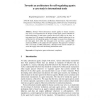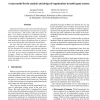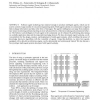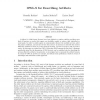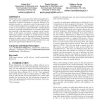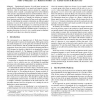144
click to vote
ATAL
2010
Springer
15 years 3 months ago
2010
Springer
In open, dynamic multi-agent systems, agents may form short-term ad-hoc groups, such as coalitions, in order to meet their goals. Trust and reputation are crucial concepts in thes...
129
Voted
ATAL
2009
Springer
15 years 3 months ago
2009
Springer
Abstract--Norm-enforcement models applied in human societies may serve as an inspiration for the design of multi-agent systems. Models for norm-enforcement in multi-agent systems o...
122
click to vote
ATAL
2009
Springer
15 years 3 months ago
2009
Springer
Multi-agent systems (MASs), comprised of autonomous entities with the aim to cooperate to reach a common goal, may be viewed as computational models of distributed complex systems ...
135
Voted
ICMAS
1998
15 years 3 months ago
1998
This paper presents a generic meta-model of multi-agent systems based on organizational concepts such as groups, roles and structures. This model, called AALAADIN, defines a very ...
167
click to vote
ISPE
2003
15 years 3 months ago
2003
: Software agent technology has matured enough to produce intelligent agents, which can be used to control a large number of concurrent engineering tasks. Multi-agent systems are c...
100
click to vote
EUMAS
2006
15 years 3 months ago
2006
Artifacts for Multi-Agent Systems have been defined as runtime entities providing some kind of function or service that agents can fruitfully exploit to achieve their individual o...
EUMAS
2006
15 years 3 months ago
2006
Fault tolerance is an important property of large-scale multiagent systems as the failure rate grows with both the number of the hosts and deployed agents, and the duration of com...
151
click to vote
CLIMA
2004
15 years 3 months ago
2004
Abstract. We introduce a logical framework suitable to formalize structures of epistemic agents. Such a framework is based on the notion of weighted directed acyclic graphs (WDAGs)...
135
click to vote
AOIS
2006
15 years 3 months ago
2006
People tend to form social networks within geographical areas. This can be explained by the fact that generally geographical localities correspond to common interests (e.g. studen...
137
click to vote
DAGSTUHL
2007
15 years 3 months ago
2007
Organisational structures for multi-agent systems are usually defined independently of any spatial and temporal structure. Therefore, when the multi-agent system is situated in a ...

